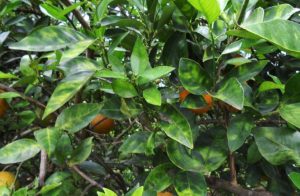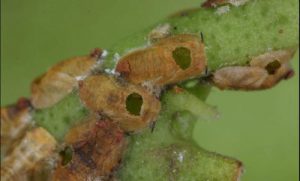
Citrus greening (also known as HLB or Huanglongbing) is a bacterial disease affecting citrus production around the world, it was first found in South Florida in 2005. Citrus greening affects all citrus cultivars causing overall tree decline/ dieback, premature fruit drop, and eventually death. The disease is believed to be caused by the bacterium Candidatus Liberibacter asiaticus. The Asian citrus psyllid, Diaphorina citri, transmits the bacteria and is found throughout Florida. Citrus greening causes over $543 million in damages to the citrus industry annually. There is no cure once a tree has been infected with citrus greening, however we now have a biocontrol to help begin the fight against citrus greening: a parasitoid called Tamarixia radiata.
Diagnosing Citrus Greening

Early symptoms of Citrus greening on leaves include vein yellowing and asymmetrical chlorosis referred to as “blotchy mottle.” The blotchy mottle symptom is the most common diagnostic symptom of the disease and often resembles nutrient deficiencies similar to zinc, iron, and manganese. Early symptoms may appear on a single shoot or branch. The yellowing usually spreads throughout the tree over a year, especially on young trees, and affected trees may show twig dieback, causing the productivity to decline within a few years. Fruit are often few in number, small, may be lopsided with a curved central core, and fail to color properly, remaining green near the stem. Many fruit drop prematurely from infected trees. The affected fruit often contain aborted seeds and have a salty bitter taste. Remember, there is no cure for citrus greening and infected trees should be removed and disposed of. If you have concerns that your tree may be infected with citrus greening, contact your local extension office or visit http://www.crec.ifas.ufl.edu/extension/greening/symptoms.shtml
Biological Control

Biological control for citrus greening is now available to Florida residents at no charge and comes in the form of a tiny wasp, Tamarixia radiata, (it does not bite or sting people) that hunts the Asian citrus psyllid. The release of this parasitoid was found to be very effective at reducing the Asian citrus psyllid population within one year of their release in India in 1978. The life span of adult Tamarixia ranges from 11 – 24 days and it takes them 11 days to mature from eggs to the adult stage. In addition to killing Asian citrus psyllid nymphs through parasitism, adult females feed on younger nymphs as well as on the honeydew excreted by the Asian citrus psyllid. Releasing Tamarixia in your home landscape will help produce a viable population across the state to fight the Asian citrus psyllid. Pick up dates are being scheduled at UF/IFAS Extension County offices across the state.
Healthy Citrus Tips
● Don’t use mulch around the base of your citrus trees
● Remove weeds and sod from beneath the citrus tree canopy to prevent root rot issues
● Get your pH right, most plants prefer a pH of 5.5 to 6.5
● Fertilize every 6 weeks from February to October with a balanced citrus fertilize such as an 8-8-8 plus micronutrients
● Prune suckers from young trees, adult trees do not require pruning
● Don’t over water, citrus doesn’t like wet feet!
● Scout for insects weekly, look on the underside of leaves and look for other evidence such as honeydew or black sooty mold
● Keep food safety in mind. Do not use any pesticide or herbicide products that are not labeled for citrus and be sure to read the label before applying!
● For more information on growing citrus, see: http://edis.ifas.ufl.edu/hs132
For more information or to register for programs call 352-671-8400 or email maxine32666@ufl.edu
 0
0
